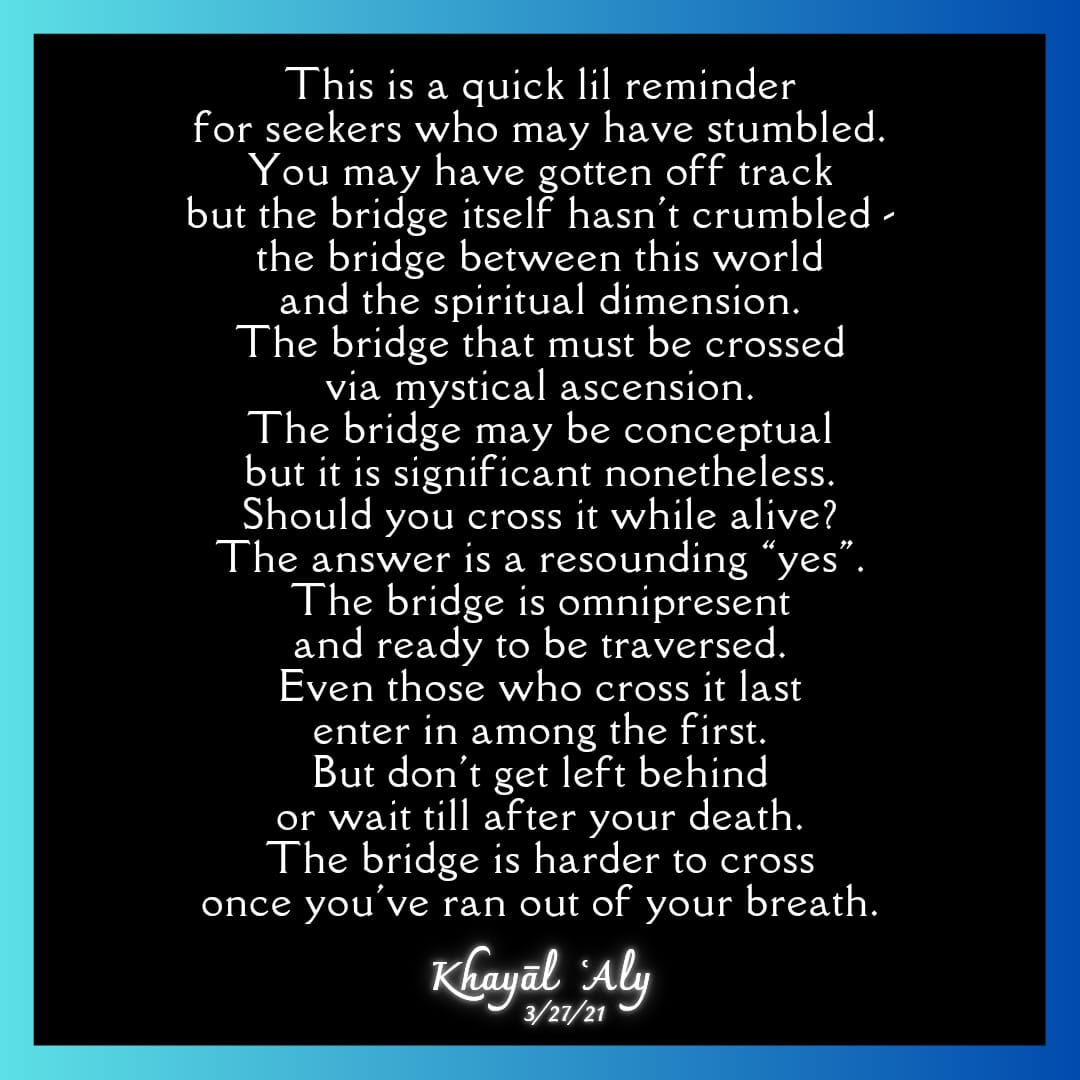Gettin Jiggy wit Jihad: Does Holy War Have an Esoteric Meaning? (7 min. read)
The Spiritual Significance of Struggle (Jihad) in Ismaili Islam
Does jihad, usually understood as Islamic “holy war”, have an esoteric or spiritual meaning? According to Nasir al-Din Tusi, arguably the most accomplished Muslim scholar of the 13th century and chief Ismaili missionary (da‘i al-du‘at) or “summoner” to the Shi‘i Imam’s unique haqiqi (true) and salvific teaching, “the exoteric aspect of jihād (endeavor) is to hate the enemies of Truth (ḥaqq), and its esoteric aspect is to try to abandon [worldly] lusts and pleasures and sacrifice them in the path of Truth (rāh-i haqq)”.1 Similarly, in a collaborative Ismaili text, Paradise of Submission, our Ismaili da‘i writes: “The real struggle (ḥaqīqī jihād) is to combat one’s self, afflicted with all that this potentially ungodly, apart or dissociated from God, by the aid of God’s Selfhood (huwiyyat), the Almighty Necessary Being”.2
Grounding his teachings on the esoteric aspect of jihad in the Prophetic Traditions (ahadith), ‘Allamah Nasir al-Din Nasir Hunzai, the great contemporary Ismaili ‘arif-i kamil (spiritually resurrected and hence perfected sage), reminds his students that:
The Holy Prophet has said: “We have returned from the minor jihād to the major jihād.” (That is, now we will do jihād against the carnal soul) [Ghāzalī, Iḥyā’u ‘Ulūmi’d-Dīn, III, p. 7). The Holy Prophet has also said: “The mujāhid is the one who (duly) does jihād against his carnal soul.” Further he says: “The greatest enemy is your carnal soul which is between your two sides” (Ibid., p. 4). These clear teachings of the Holy Prophet show that the major jihād means to fight against the carnal soul, which is extremely necessary.3
‘Allāmah Hunzai, Practical Sufism and Spiritual Science, 82.
Based on the Prophet’s spiritual teachings about a jihad against one’s ‘carnal soul’, ‘Allamah Hunzai reveals a ta’wili (esoteric) and spiritually positive reading of verse 2:54 of the Qur’an, in which, apparently, Moses commands those of his followers who have mistreated, or “been unjust”, to themselves to slay themselves in order to return to their Lord:
When the children of Israel wronged themselves by taking the golden calf as God, they were enjoined to kill their carnal soul as punishment and return to God. This is the real meaning of “And slay yourselves [fa-uqtulū anfusakum]” [in verse 2:54: “And (remember the time) when Moses said to his people: ‘O my people! You have surely been unjust to yourselves/your souls (anfusakum) by taking the calf (for a god), therefore, return in repentance (fa-tūbū) to your Creator and slay yourselves/slay your souls’ (fa-uqtulu anfusakum)”], because returning to God or repentance is a personal action which has nothing to do with the sword of any other person. Also, repentance or turning to God [actually] means advancing in the stages of spirituality and of attaining the proximity of God. Thus, in the guise of the example of the children of Israel, the chosen servants of God are addressed in this verse in order for them to benefit from the rewards of the ‘voluntary death’ before the ‘compulsory death’.
‘Allamah Hunzai, Practical Sufism and Spiritual Science, 82.
In order to benefit from the rewards of the ‘voluntary death’ — that is to say, the special ‘death’ which is volitional, spiritual or ‘irfani (related to ma‘rifa, i.e. gnosis) — one must “slay” (again, in a spiritual or gnostic sense) one’s carnal soul, which, in fact, is the lower, immature aspect of one’s soul that, due to its being susceptible to “devilish” influences, prevents one from spiritual progress and Divine proximity. Therefore, in response to the following question, “It is said in a ḥadīth: ‘If the devils were not hovering around the hearts of the children of Adam, they would have seen the [spiritual] kingdom and [the secrets of] the heaven’. How is it possible to get rid of all such devils?”, ‘Allamah Hunzai confirms that
It is possible through the death of the carnal soul and personal resurrection, because the devil is given respite until the resurrection (7:14; 15:36; 38:79). Since the personal resurrection of the ‘ārif [i.e. one who attains ma‘rifa] is the universal victory of the major jihād, therefore, the devil and the carnal soul are subjugated, and certainly the ‘ārif can see the subtle world.4
In the following (purposefully playful and provocative) poem, which offers some words of advice to ‘irfani-minded sufis who expect to live their “best life”, i.e., a spiritual life of ma‘rifa, there is also a warning about the same danger which is mentioned above, namely, the negative influence of the devils which hover around the hearts of humans and infect them with their filth.
Before concluding this short post on the esoteric understanding of jihad, for additional inspiration to avoid or remove devilish germs or deadly filth, we may turn to the spiritual counsel of the Ismaili shaykh, Pir Shihab al-Din Shah al-Husayni⁽ᶜ⁾, the elder brother of the 48th Ismaili Imam, Mawlana Sultan Muhammad Shah⁽ˢ⁾, Aga Khan III. Like his predecessors in the Da‘wat-i Haqq [Summons of Truth], Pir Shihab al-Din Shah urges mu’mins (faithful believers) of the Ismaili Jamat to understand and realize the true meaning and importance of esoteric jihad, which he associates with one’s advancement on the straight or right path (sirātu’l-mustaqim). The Pir writes:
The real meaning of the great jihād is a war against one’s own vile instincts to bring them under control, so that those low passions which constantly endeavor to deviate one’s feet from the path of rectitude, in opposition to the behest of reason/intellect, may cease to mislead one into acting against the prescriptions of the true religion. It is one’s duty to bring the impulses of one’s instincts under the control of one’s reason/intellect, training nature always to obey and to comply with the dictates of reason. This constitutes the substance of what is called ‘salvation’; in this lies the true meaning of the expression ṣirāṭu’l-mustaqīm, i.e., the bridge narrow as the edge of a sword which leads to Paradise. To bring these instincts under control is to walk along the right path.
[. . .] And verily this is so, for there is no matter of greater importance than to purify one’s own self. Only by this may one hope to progress along the path of rectitude, because there is no greater obstacle against success in this direction than one’s own lower instincts, which obstructs one’s fulfillment of the dictates of religious philosophy and the commandments of the Divine religion.
[. . .] If this is not done, it [i.e., one’s carnal soul] may take one out of the [right] way, overpowering one’s will, raising its head from Hell, and thus, prevent one from attaining the position of communion (maqāmi qurb) with God.5
Pīr Shihāb al-Dīn Shāh al-Ḥusāynī, True Meaning of Religion, pp. 1-2 (translation slightly modified).
Yā ‘Alī Madad to all readers and seekers of Ismaili Gnosis. May we all be blessed with the greatest success as we spiritually struggle and progress on Ṣirāṭu’l-Mustaqīm, the Upright Path of Gnostic Resurrection.
Āmīn, Ya Rabb al-‘Alamīn,
Khayāl ‘Aly
July 16th, 2024
khayal.aly@gmail.com
Follow on Instagram
(khayal.aly | ismaili.poetry | khana_yi_khayr
“Jihad is before anything else, a personal discipline.
To begin, it is the search for personal improvement,
which means that it is a personal effort in life.”
- Imam Shah Karim al-Husayni, Aga Khan IV6
Ismaili Gnosis Needs Your Support to Continue: How You Can Help us in Publishing New Articles
IN CASE YOU MISSED IT
Naṣīr al-Dīn Ṭūsī, Matlūb al-Mu’minin (Desideratum of the Faithful), translated by S.J. Badakhchani in his Shiʿi Interpretations of Islam: Three Treatises on Theology and Eschatology, 40.
Naṣīr al-Dīn Ṭūsī with Ḥasan-i Maḥmūd, Rawḍa-yi Taslīm, translated by S.J. Badakchani as Paradise of Submission: A Medieval Treatise on Ismaili Thought, 151.
‘Allāmah Naṣīr al-Dīn Naṣīr Hunzai, ‘Amalī Taṣawwuf awr Rūḥānī Science, translated by Faqir Muhammad Hunzai and Rashida Noormohamed-Hunzai as Practical Sufism and Spiritual Science, 82.
‘Allāmah Naṣīr al-Dīn Naṣīr Hunzai, Ṣanādīq-i Jawāhir, translated by Faqir Muhammad Hunzai and Rashida Noormohamed-Hunzai as Caskets of Pearls, volume 1, p. 65.
Pīr Shihāb al-Dīn Shāh al-Ḥusāynī, Risāla dar Ḥaqīqat-i Dīn, translated by Wladimir Ivanow as True Meaning of Religion, 1-2, (translation slightly modified).
Interview of H.H. The Aga Khan, Lebanese Broadcasting Corporation International [LBC] Aleppo, Syria, November 8, 2001.











